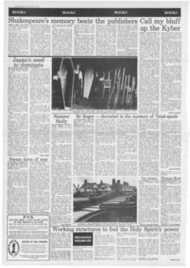Page 6, 16th January 1987
Page 6

Report an error
Noticed an error on this page?If you've noticed an error in this article please click here to report it.
Tags
Share
Related articles
An Inspired And Unusual Woman
Books Of The Week
Broadcasting
Annuals And Tales
Fairy Tales, Folk Tales And Stories By The Bundle
Shakespeare's memory beats the publishers
Winter's Tales, New Series Two Edited and Introduced by Robin Baird-Smith, (Constable, £8.95).
WHENEVER I come across any short stories I am instantly reminded of the anecdote about the comic genius Stephen Leacock, who went in search of a bottle of red ink. After having no luck at several shops he made one last effort to buy the product, and was told "Sorry sir, we don't stock it. You see there's just no call for it; and you're the fifth person I've told that to this week".
Publishers, agents and literary types have fostered the myth that the age of the short story is long dead and best forgotten unless you are famous enough to have even your school essays published. After the appearance of a volume like this the powers that be really should change their collective minds.
Constable have led the field in the short story genre, and the motive behind this latest book is simply to place the best in the field together. There is no common link, no binding theme. Most of the writers are wellknown, some are relatively obscure. "Each category of writer is as important to the collecton as the other" writes editor Robin Baird-Smith, and the extraordinary thing is that he is correct. Billington, Borges and Spark balance deliciously with writers who are published here for the first time in volume form.
Rachael Billington opens the selection, followed by Jorge Luis Borges' Shakespeare's Memory. This is the Borges imagination and wit at best, with a fecundity probably unequaled in Britain at the moment. The tale is of a man who receives the gift of the Bard's memory, and of course that type of miraculous present involves dangers and doom. When Borges' character is tempted with the memory he says "I could not utter a single word. It was as if I had been offered the sea." A crisp beauty which characterises the entire book.
Jane Gardam's contribution is entitled Benevolence, and explores the realities and deceiving appearances of doing good. It's a careful, clever portrait, never falling into welltrodden paths or taking the easy option.
Michael Tournier has written a short, seductive piece specifically for the book; though only a few hundred words long it does haunt the senses. The Music of the Spheres is best described as an allegory on perfection and its loss. Adam and Eve discover music. "And no sooner had they eaten of the tree of music than their ears were stopped. They no longer heard the music of the spheres, and a funeral silence fell upon them.
"That was the end of Paradise", he continues, "and the beginning of the history of music. Adam and Eve and their descendents after them began to stretch skins over calabashes and hair over bows. They bored holes in reeds and twisted nuggets of copper into tuning forks. The process went on for centuries, and there was Orpheus; there were Monteverdi, Bach, Mozart and Beethoven; there were Ravel, Dubussy and Boulez."
Piers Paul Read writes of how the English deal, or fail to deal, with sex and children. The Carter-Clark family have all that they desire, except for a son and heir. Much effort goes into the task, but Amelia and Adam are unfortunate. That the solution comes in the form of a "vulgar little man wearing crocodile shoes and a silk suit" gives the witty story a suitable twist and pointed conclusion.
James Chatto, Monica Furlong and Rose Tremain also provide offerings for the book and Muriel Spark's The Dragon is a moral analysis of ruthlessness and extremities. It is genuinely hard to find any major fault with the selection and content of the second in what should become an annual treat; if only there was a demand for the short story!
Michael Coren
Michael Coren is preparing a life of G K Chesterton to be published by Jonathan Cape.
blog comments powered by Disqus











